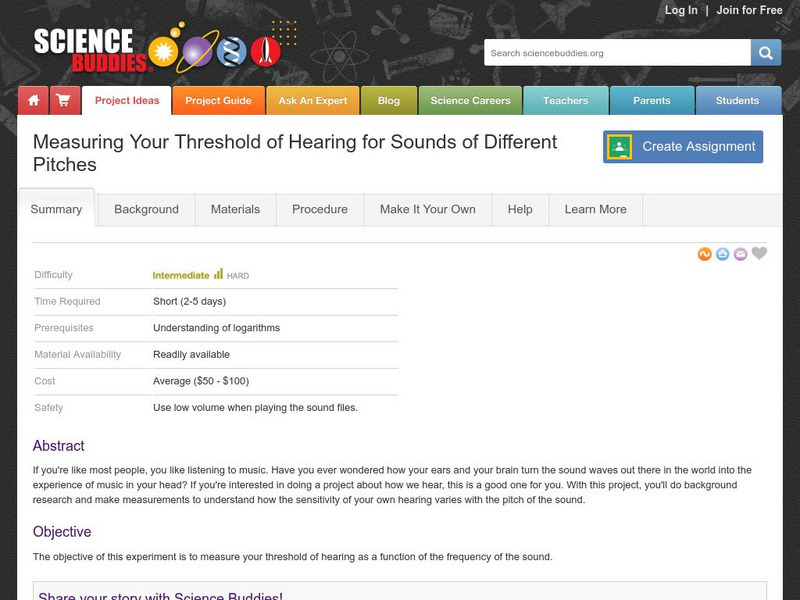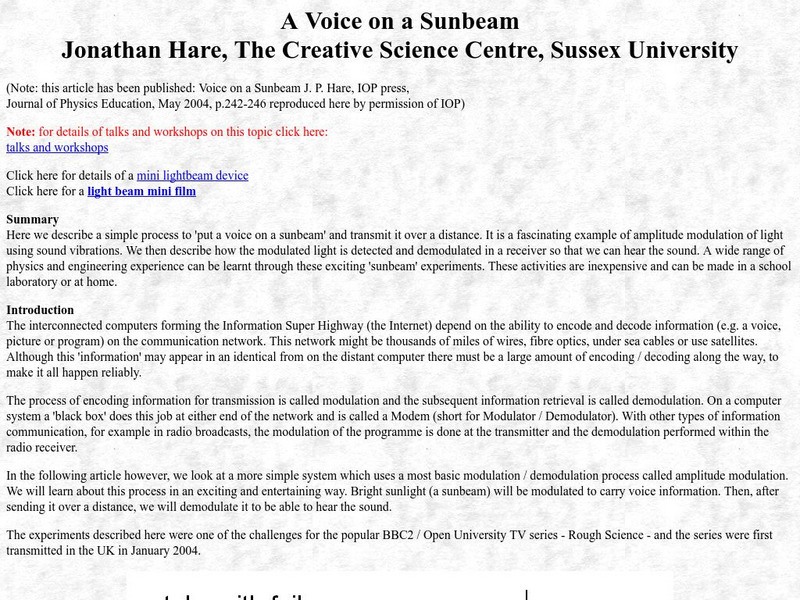Hi, what do you want to do?
Science Buddies
Science Buddies: Measuring Your Threshold of Hearing
How your ears and your brain turn the sound waves out there in the world into the experience of music in your head, remains a mystery to many, but yet we all experience and even enjoy sounds and music. If you're interested in doing a...
TeachEngineering
Teach Engineering: Hearing: How Do Our Ears Work?
Students learn about the anatomy of the ear and how the ears work as a sound sensor. Ear anatomy parts and structures are explained in detail, as well as how sound is transmitted mechanically and then electrically through them to the...
Scholastic
Scholastic Instructor: Science of Sound
This resource is for teachers who are looking for information, activities, experiments, and more pertaining to the science of sound.
University of Washington
Hearing: Activities, Experiments, Models and More
Come and learn more about one of the five senses? Hearing is an integral part of our everyday life. To learn more use the activities, experiments, models and more wrapped into this hearing website.
Science Buddies
Science Buddies: Sound Bites: Tasting the Texture of Classical Music
Did you know that your sense of hearing can determine texture? This Science Buddies science fair project has you experiment with four major eras in western music to determine the texture of the music. The Science Buddies project ideas...
Creative Science Centre
Creative Science Centre: A Voice on a Sunbeam
Here is described a simple process to 'put a voice on a sunbeam' and transmit it over a distance. It is a fascinating example of amplitude modulation of light using sound vibrations. It then describes how the modulated light is detected...
Alabama Learning Exchange
Alex: Vibrations We Can See, Feel and Hear
This four-part lesson allows students to explore the question of how sounds are made. Using wooden rulers, tongue depressors and tuning forks, students will explore and experience sound. Students will use what they have learned to create...
Nobel Media AB
The Nobel Prize: Pavlov's Dog
You have to use the principles behind Pavlov's conditioning experiments in order to play this game and get the dog to drool when he hears a sound. You can also get more information about Ivan Pavlov and his research.
PBS
Pbs Learning Media: Atlanta Symphony Orchestra: Live Exploration
Take a special trip to the Atlanta Symphony Orchestra with GPB Education! This interactive virtual exploration offers students a behind-the-scenes experience as they learn about the science of sound and the preparation it takes to put on...
PBS
Pbs Teachers: Mystery of the Senses Hearing
Understand how humans can focus on familiar voices and language over other sounds, by experimenting with what classmates hear when conversations are taking place simultaneously.
Treehut
Suzy's World: Ears
Find out how your ears work and try an experiment involving your hearing.













